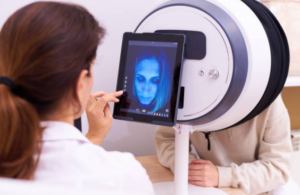From Pixels to Perfection




In a world where technological advancements continue to reshape every aspect of our lives, it comes as no surprise that the beauty industry is also undergoing a transformative journey. Digital dermatology, powered by artificial intelligence (AI), is at the forefront of this revolution, promising a future of skincare that is not only personalized but also highly effective. In this blog post, we’ll delve into the fascinating realm of Digital Dermatology and explore how AI is paving the way for the next generation of skincare.
Understanding Digital Dermatology
In the ever-evolving landscape of skincare, the emergence of Digital Dermatology stands as a testament to the transformative potential of technology. At its core, Digital Dermatology harnesses the power of artificial intelligence (AI) and advanced data analytics to revolutionize how we perceive and address skincare concerns. Let’s delve deeper into the nuances of this tech-infused skincare revolution.
- AI Algorithms and Skin Data Processing:Digital Dermatology’s cornerstone is its sophisticated AI algorithms, capable of processing vast amounts of skin-related data. This encompasses a spectrum of variables, from genetic predispositions and lifestyle factors to environmental influences. AI, with its data-crunching prowess, not only identifies patterns and correlations but also adapts its insights as it learns from diverse datasets.
- Individualized Skincare Recommendations:Traditional skincare often adopts a one-size-fits-all approach, leaving individuals to navigate a maze of products to find what suits their unique skin. Digital Dermatology disrupts this paradigm by tailoring recommendations based on an individual’s specific needs. Factors such as skin type, sensitivity, hydration levels, and concerns are meticulously considered, resulting in a personalized skincare plan that goes beyond generic solutions.
- Machine Learning in Skincare Analysis:Machine learning, a subset of AI, plays a pivotal role in Digital Dermatology by enabling continuous improvement and adaptation. As users engage with AI-driven skincare platforms, machine learning algorithms analyze user feedback, outcomes, and evolving skin conditions. This iterative process refines the accuracy of skincare recommendations over time, ensuring a dynamic and responsive approach to individualized care.
- Integration of IoT Devices:The Internet of Things (IoT) has found its way into skincare through the integration of smart devices. These devices, ranging from handheld scanners to facial recognition cameras, provide real-time data for a comprehensive skin analysis. For example, a smart device might assess skin moisture levels, pore size, and fine lines, offering users an immediate understanding of their skin’s condition.
- Biometric Skin Measurements:Digital Dermatology embraces biometric measurements to quantify and qualify various aspects of skin health. These measurements extend beyond the surface, delving into deeper layers to assess collagen levels, elasticity, and even cellular health. By combining these quantitative metrics with AI analysis, Digital Dermatology offers a holistic view of skin health, paving the way for more targeted and effective skincare interventions.


The Power of Artificial Intelligence
At the heart of the Digital Dermatology revolution lies the formidable power of artificial intelligence (AI), a technological marvel that is reshaping the skincare landscape. The application of AI in skincare goes beyond mere data processing – it is a dynamic force that transforms how we approach, understand, and address the intricacies of individual skin health.
- Data Processing on a Grand Scale:AI’s unparalleled ability to process colossal amounts of data is a game-changer in the world of skincare. Traditional approaches often struggle to sift through diverse datasets, but AI algorithms excel at this task. Whether it’s genetic information, lifestyle choices, environmental factors, or historical skincare data, AI effortlessly synthesizes this information to create a comprehensive profile of an individual’s skin health.
- Pattern Recognition for Precision:Where human observation may be limited, AI thrives in identifying intricate patterns and correlations within datasets. This extends to recognizing subtle changes in skin conditions over time, allowing for a level of precision that surpasses traditional diagnostic methods. AI’s capacity for pattern recognition forms the foundation for creating personalized skincare regimens tailored to each individual’s unique needs.
- Continuous Learning with Machine Learning:The integration of machine learning algorithms ensures that AI in Digital Dermatology is not static; it’s a continuously evolving entity. As users engage with AI-driven skincare platforms, machine learning algorithms analyze outcomes and user feedback, refining and enhancing the accuracy of skincare recommendations. This iterative learning process empowers AI to adapt to the ever-changing dynamics of an individual’s skin.
- Complex Analysis for Holistic Insights:Digital Dermatology powered by AI doesn’t limit itself to surface-level analysis. Instead, it delves into complex biometric measurements, assessing factors such as collagen levels, skin elasticity, and cellular health. AI’s ability to synthesize and interpret this multifaceted information provides users with a holistic understanding of their skin health, enabling targeted interventions that address both visible and underlying concerns.
One of the most exciting aspects of Digital Dermatology is its ability to provide truly personalized skincare routines. No two individuals have the exact same skin, and factors such as genetics, lifestyle, and environment play crucial roles in determining skincare needs. AI takes all of these variables into account, creating a skincare plan that is unique to each person.
Imagine a skincare routine designed specifically for your skin type, considering factors like sensitivity, hydration levels, and even environmental conditions. Digital Dermatology aims to make this vision a reality by utilizing AI to analyze your skin’s characteristics and recommend products tailored to address your specific concerns.


Real-Time Skin Analysis
Digital Dermatology also offers the convenience of real-time skin analysis. With the help of AI-powered apps and devices, individuals can assess their skin condition at any given moment. These tools can analyze factors such as moisture levels, pores, fine lines, and even the impact of external elements like pollution or UV exposure.
This real-time analysis empowers users to make informed decisions about their skincare routine on a day-to-day basis. If, for instance, the app detects increased dryness, it might recommend a more hydrating moisturizer or adjustments to the current routine. This dynamic approach ensures that skincare remains adaptable and responsive to the ever-changing needs of your skin.
Digital Dermatology extends beyond mere data analysis; it also opens the door to virtual consultations with AI dermatologists. These virtual consultations can provide personalized recommendations based on a thorough analysis of your skin’s condition and your specific concerns. While it doesn’t replace the expertise of a human dermatologist, AI consultations offer accessible and immediate guidance to individuals seeking skincare advice.
The Ethical Aspect of AI in Skincare
While the integration of artificial intelligence (AI) into skincare holds immense promise for personalized beauty solutions, it’s imperative to weave an ethical tapestry that prioritizes user privacy, inclusivity, and transparency. As we venture into the realm of Digital Dermatology, ethical considerations become paramount in ensuring that the benefits of AI-driven skincare are accessible, unbiased, and respectful of individual rights.
- Data Security and Privacy Measures:In the digital age, where personal data is a valuable commodity, safeguarding user information is non-negotiable. Digital Dermatology platforms leveraging AI must implement robust data security measures to protect sensitive information, including genetic data, biometric measurements, and user profiles. Encryption, secure servers, and stringent access controls are vital components of an ethical AI skincare ecosystem.
- Transparent Data Usage Policies:Transparency is the bedrock of ethical AI in skincare. Users should have a clear understanding of how their data will be used, stored, and shared. AI-driven platforms must provide comprehensive and easily understandable data usage policies. This transparency builds trust and empowers users to make informed decisions about participating in AI-driven skincare programs, fostering a relationship based on openness and accountability.
- Inclusivity in Dataset Training:The ethical deployment of AI in skincare requires diverse and representative datasets. To avoid perpetuating biases, algorithms should be trained on a wide range of skin types, ethnicities, genders, and ages. Inclusivity in dataset training ensures that the benefits of personalized skincare are accessible to individuals from various backgrounds, minimizing the risk of inadvertently excluding specific demographic groups.
- Guarding Against Algorithmic Bias:Despite efforts to curate diverse datasets, AI algorithms may still exhibit biases. Recognizing and addressing algorithmic biases is an ongoing ethical responsibility. Skincare AI developers should continuously monitor and refine algorithms to ensure fairness and impartiality in recommendations. Transparent reporting on bias detection and mitigation strategies further enhances the accountability of AI-driven skincare platforms.
- User Consent and Control:Respecting user autonomy is a cornerstone of ethical AI in skincare. Individuals should have the right to control the extent to which their data is utilized. Consent mechanisms should be explicit, allowing users to opt-in or opt-out of specific features or data-sharing practices. Additionally, users should have the ability to update their preferences over time, fostering a sense of agency in the AI-driven skincare journey.
- Educating Users on AI Limitations:Ethical AI in skincare demands transparency not only about data usage but also about the limitations of the technology. Users should be informed that AI is a tool, not a substitute for professional dermatological expertise. Clear communication about the scope and capabilities of AI ensures realistic expectations and discourages overreliance on technology for complex skincare concerns.
- Addressing Discrimination and Fair Access:The ethical deployment of AI in skincare requires addressing issues of discrimination and ensuring fair access to personalized skincare recommendations. Developers should actively work to eliminate biases that may disproportionately affect certain groups. Additionally, efforts should be made to make AI-driven skincare solutions accessible and affordable to a broad audience, preventing the creation of exclusive beauty technologies.
- Ongoing Ethical Audits and Compliance:Ethical responsibility doesn’t end with the initial deployment of AI in skincare. Continuous ethical audits and compliance checks are necessary to ensure that evolving technologies align with ethical standards. Regular assessments of data handling practices, algorithmic fairness, and privacy policies contribute to the ongoing ethical integrity of AI-driven skincare platforms.
- Community Engagement and Feedback Loops:Establishing open channels of communication with users fosters community engagement and feedback loops. Ethical AI in skincare involves an ongoing dialogue between developers and users. User feedback can contribute to refining algorithms, addressing concerns, and shaping the ethical evolution of AI-driven skincare technologies.


As Digital Dermatology continues to evolve, its impact on the beauty industry is becoming increasingly evident. The future of skincare is moving away from generic, one-size-fits-all solutions and towards a personalized, data-driven approach. AI is poised to become an indispensable tool in the hands of skincare enthusiasts, helping them achieve optimal results with minimal guesswork.
In conclusion, the marriage of Digital Dermatology and AI represents a groundbreaking advancement in the beauty industry. The promise of personalized skincare, real-time analysis, and virtual consultations heralds a future where individuals can confidently navigate their skincare journey with tailored precision. As technology continues to weave its way into our daily lives, the future of beauty looks brighter and more personalized than ever before. Embrace the digital revolution, and let your skincare routine evolve with the power of AI.

